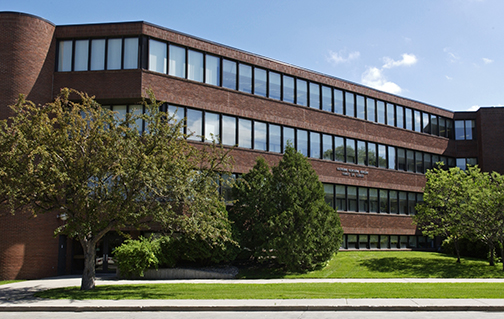
Mathematics Education
This is an archived copy of the 2019-20 catalog. To access the most recent version of the catalog, please visit https://catalog.ndsu.edu.
The Program
Candidates in the Mathematics Education major are prepared to teach a diverse curriculum to a diverse student population. Mathematics is the language of science and technology, and its history as the oldest and most highly developed discipline make math one of the most exciting and rewarding areas of study for the 21st Century.The mathematics education student should work closely with an advisor to be sure that the general education courses taken will provide a strong foundation for the advanced courses in the major.
Professional Education Courses
Students may enroll in the 300-level professional education courses before being formally admitted to the School of Education (SOE). Prior to enrolling in the 400-level courses, students must complete the application for admission to the SOE; attain a minimum of a 2.75 grade point average overall in their course work, education courses, and teaching specialty courses; and pass the Core Academic Skills for Educators exam(s). Requirements for admission can be found on the School of Education website.
Student Teaching
Student teaching is the culmination of the teaching program. Students have the opportunity to apply skills acquired in college courses under the supervision of an experienced mathematics educator.
Student Advisement
Students will be assigned individual advisors who will work closely in program planning and in other ways to advise and assist them. Students are encouraged to seek their advisors' help whenever needed.
Certification
Upon completing this program, students are eligible for certification to teach mathematics in most states. The program is accredited by the National Council for Accreditation of Teacher Education (NCATE).
Career Opportunities
The mathematics education degree prepares students to teach Grades 7-12 in the United States and internationally. The major in mathematics is also valued by a wide range of employers in government and industry. Mathematics teachers may also choose to pursue graduate degrees after building classroom experience. Those masters and doctoral degrees could lead to post-secondary academic positions and leadership roles in state and national educational organizations.
Plan of Study
Please note this is a sample plan of study and not an official curriculum. Actual student schedules for each semester will vary depending on start year, education goals, applicable transfer credit, and course availability. Students are encouraged to work with their academic advisor on a regular basis to review degree progress and customize an individual plan of study.
| First Year | |||
|---|---|---|---|
| Fall | Credits | Spring | Credits |
| ENGL 110 or 120 | 3-4 | COMM 110 | 3 |
| MATH 165 | 4 | Social/Behavioral Science | 3 |
| Humanities/Fine Arts | 3 | MATH 129 | 3 |
| Science & Technology w/Lab | 4 | MATH 166 | 4 |
| Wellness | 2-3 | PHYS 211 | 3 |
| PHYS 211L | 1 | ||
| 16-18 | 17 | ||
| Second Year | |||
| Fall | Credits | Spring | Credits |
| CSCI 160 | 4 | EDUC 322 | 3 |
| EDUC 321 | 3 | Science & Technology (Geoscience, Chemistry, Physics or Biology) | 3 |
| MATH 265 | 4 | MATH 329 | 3 |
| MATH 270 | 3 | MATH 440 | 3 |
| STAT 367 | 3 | STAT 368 | 3 |
| Complete Core Academic Skills Exam | Apply to the School of Education | ||
| 17 | 15 | ||
| Third Year | |||
| Fall | Credits | Spring | Credits |
| EDUC 451 | 3 | EDUC 481 | 3 |
| EDUC 489 | 3 | Humanities/Fine Arts | 3 |
| Social/Behavioral Science | 3 | Upper Division Writing | 3 |
| MATH 346 | 3 | MATH 266 | 3 |
| MATH 420 | 3 | MATH 478 | 3 |
| 15 | 15 | ||
| Fourth Year | |||
| Fall | Credits | Spring | Credits |
| EDUC 486 | 3 | EDUC 485 | 1 |
| undefined | EDUC 487 | 9 | |
| Elective | 3 | EDUC 488 | 3 |
| Elective | 3 | ||
| MATH 374 | 1 | ||
| MATH 450 | 3 | ||
| Apply for Student Teaching | |||
| Complete PLT (grades 7-12) Exam | |||
| Complete Subject Area Assessment Exam | |||
| 13 | 13 | ||
| Total Credits: 121-123 | |||
